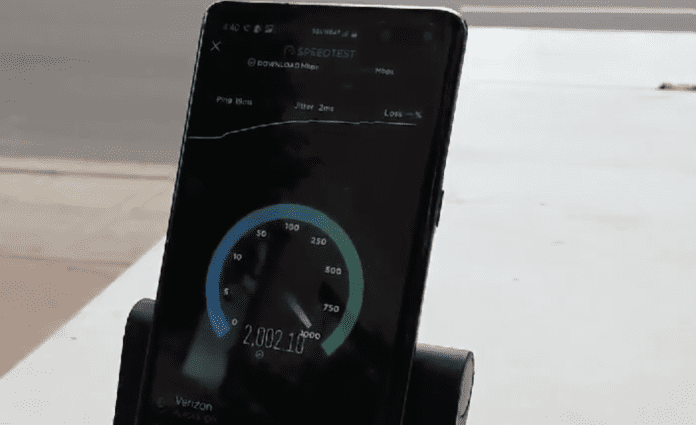Providence getting millimeter wave 5G on July 1
Continuing to work toward its goal of mobile 5G in more than 30 cities by the end of the year, Verizon today announced commercial 5G is live in Denver and coming to Providence beginning July 1. The operator previously launched 5G using its millimeter wave spectrum in Chicago and Minneapolis.
In press materials, Verizon showed off a speed test indicating more than 2 Gbps down on its Denver network. Pictures posted on Twitter showed upload speeds in the 29 Mbps range.
Verizon currently has four 5G-compatible handsets available–the LG V50 ThinQ 5G, the Samsung Galaxy S10 5G and the Moto z3 and z4, both of which require a clip-on 5G “mod.” All of those devices use Qualcomm modems.
In a corporate video, Krista Bourne of Verizon’s Consumer Group said, “Whatever kind of experiences they’re looking to deliver, they can get that done through the 5G access we’re going to provide–gaming, work, productivity, you name it, it’s going to be possible because of 5G.”
In addition to its mobile 5G build, Verizon is also deploying fiber in more than 60 markets. Speaking last week at the Wells Fargo 5G Forum, company Executive Vice President and Chief Technology Officer Kyle Malady touched on the integrated fiber/mobile strategy. “As the networks flatten and the antennas get smaller and you put them lower, I think the best way to characterize it is frankly wireless becomes fiber with antennas hanging off of it essentially. That’s why we decided we wanted to go big into fiber. It made sense to us because we’re…going to be densifying 4G. We saw 5G coming. And we see a host of other uses for the fiber.”
While Verizon’s current 5G plans are pinned to its millimeter wave spectrum holdings, the company has made clear its interest in acquiring mid-band spectrum to provide a coverage layer for 5G with CEO Hans Vestberg recently meeting with Ajit Pai, chairman of the U.S. Federal Communications Commission, to discuss the C-band.
Malady said he doesn’t see Verizon as “vulnerable” when it comes to mid-band but, “I’ll always take more spectrum. I’ll always want more because if I have more I can do more. Would I like to have it? Fantastic. Do I need to have it? Not necessarily.”
Verizon bills its mobile service as 5G Ultra Wideband and has made public plans to launch in Atlanta, Boston, Charlotte, Cincinnati, Cleveland, Columbus, Dallas, Des Moines, Detroit, Houston, Indianapolis, Kansas City, Little Rock, Memphis, Phoenix, San Diego, Salt Lake City, and Washington D.C.

